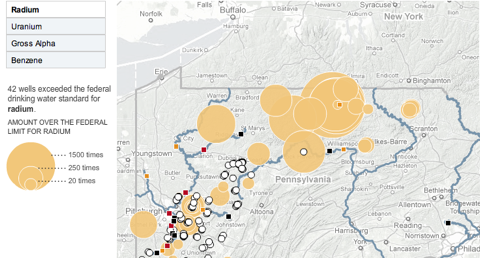
Radium contamination in Pennsylvania wells, part of the New York Times series on natural gas hydraulic fracturing.
Hydraulic fracturing, or fracking, has finally hit the big time. Not only did the New York Times make the issue the subject of a front-page series of articles this week, but Josh Fox's Gasland documentary was a runner-up in the "Best Documentary" category at Sunday's Oscar ceremony.
And there has been a slew of other fracking stories in recent days, including ProPublica's lengthy feature about a Wyoming rancher's battle with the gas industry over water contamination and a Wall Street Journal story that first published, and then seemingly censored, a comment critical of the drilling industry from an insider.
But for sheer gravitas, the Times' intensely-researched, document-heavy nine-month investigation of the industry and its regulation by state and federal governments takes the cake. The first two installments of what is to be a three-part series of articles have been published this week: the first on Sunday, and the second yesterday.
It's a huge story, and a challenge to distill. But from our reading so far, here are some important points:
It's the radioactivity, people: Fracking wastewater prompts worries that range from Gasland's depiction of flaming water faucets to the recent concerns about diesel oil. But the Times report focuses on radiation, which can cause problems when it enters the food chain. The Times report states that the wastewater produced by the hydraulic fracturing process may produce high levels of radiation, which few wastewater filtration plants test for or treat. Fracking wastewater is already being released into waterways, sometimes only partially treated, in Pennsylvania.
Regulators can't cope with the industry's pace:
“We simply can’t keep up,” said one inspector with the Pennsylvania Department of Environmental Protection who was not authorized to speak to reporters. “There’s just too much of the waste.”
Recycling wastewater Isn't so great: The investigation finds that although gas companies recycle the wastewater from the fracking process, they do so less pervasively than the industry claims.
A great de-icer: Gas companies have found a market to their salt-laden fracking wastewater: municipalities that use the sludge to de-ice roads.
One of the most impressive elements of the investigation is the documents, which the Times has not only published on its website, but has annotated with helpful highlighting that gives readers nuances that would otherwise be impenetrable. For example, one document, an email from the Pennsylvania Department of Environmental Protection to a gas industry group, contains this line:
"Ray, we are going to issue a news release ... any concerns?"
What's going on here, the Times explains, is that the Pennsylvania DEP is checking with the gas industry before it puts out a press release on a topic that involves water contamination. That, as the Times explains mildly, shows how deferential the state regulatory agency seems to be to drilling companies.
Other documents from the investigation to check out:
- The Environmental Protection Agency's draft comments on drilling for New York, which raise concerns about wastewater disposal.
- A letter from one EPA official to another containing guidance for New York's regulation of the gas industry, raising more concerns about disposal.
The responses to the series have been manifold, from U.S. Representative Maurice Hinchey's immediate denunciation of "radioactive hydrofracking waste" to an indignant critique by one of the sources quoted in the story, former Pennsylvania DEP chief John Hanger.












